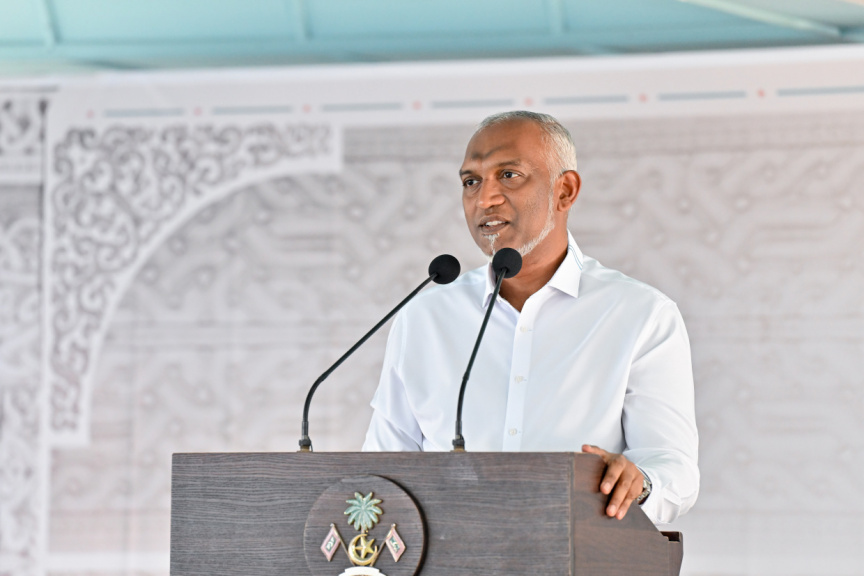
President Dr Muizzu speaks at a public gathering in B. Dhonfanu. (Photo/President's Office)
President Dr. Mohamed Muizzu staunchly defended proposed amendments to the Decentralization Act on Wednesday evening, asserting his comprehensive understanding of decentralization and emphasizing that the changes are ultimately for the benefit of the people.
His remarks were made while addressing residents of B.Dharavandhoo.
The proposed bill outlines five key amendments aimed at reforming local governance. Among these, local authority companies will be limited to essential rural infrastructure projects (investments exceeding MVR 10,000,000) and are mandated to cease competition with private enterprises within 90 days of the amendment's enactment.
Furthermore, councils will be prohibited from charging rent for land or buildings used for basic public services and will receive revenue after state tax deductions, provided they are not delinquent in public service payments for more than six months. The amendments also require councils to maintain bank accounts in accordance with Ministry of Finance procedures and provide statements upon request. In their final year, councils will face restrictions on new employee recruitment, leasing land, lagoons, or reefs, and initiating new development projects not previously specified in council development plans.
Regulations are also being amended to place restrictions on councils nearing the end of their 365-day term. They must adhere to norms set by the Ministry of Finance and the Local Government Authority (LGA) for actions such as recruiting employees, leasing land, lagoons, and reef areas, and commencing new development projects not already outlined in their plans. Notably, these amendments do not grant any additional authority to LGA, the parent body of the councils.
The President reiterated that all these reforms are designed to serve the populace. He explained, "One of the reforms is that some councils have now created local authority companies. These local authority companies are running small businesses run normally by ordinary people in rural areas. Like the grocery shops on street corners. This is actually preventing the public from attaining wealth in these markets."

President Muizzu also highlighted instances where some councils charge exorbitant rent for land allocated for public services, thereby inflating the cost of basic services for citizens. He further noted that some councils fail to pay taxes on their income, a practice the amendment will rectify, ultimately benefiting the public.
Addressing transparency concerns, the President stated, "The fourth amendment addresses the money in the accounts of the councils, which is not disclosed. Many councils. They do not disclose it to the people, and especially not to the LGA." He stressed that this lack of transparency necessitates a legal amendment to ensure councils comply.
Despite these significant changes to the decentralization system, the President affirmed his belief in the system and his past involvement in its practical implementation. "I know decentralization from A to Z," he declared.
The opposition Maldivian Democratic Party (MDP) has voiced its opposition to these reforms, alleging they are intended to curtail councils' authority and render them subservient to the central government.
Meanwhile, the Speaker of Parliament recently proposed extending the current session by a week to facilitate substantial changes to the Decentralization Act. A PNC MP, while declining to elaborate, confirmed that the government is actively working on amendments to the Decentralization Act.